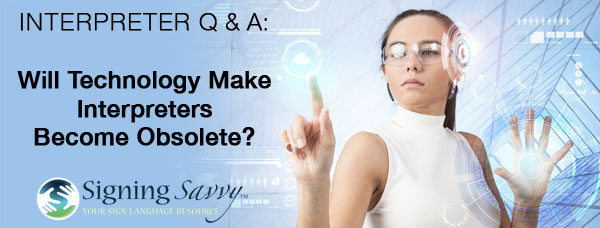
Interpreter Q & A: Will Technology and Cochlear Implants Make Interpreters Become Obsolete
This article is part of our "Dear BC, Interpreter Q & A” series, which answers questions on interpreting and Deaf culture from multiple perspectives. There isn’t always one “right” answer to every question, and different people have different opinions on how to handle different scenarios. That is why more than one perspective is provided in this series, however, more opinions always exist. These perspectives are gathered from talking with experienced interpreters and deaf consumers from across the United States and Canada and do not solely come from the author.
I am currently in an interpreter training program, but I’m starting to have doubts about the viability of my choice of careers. My concern is twofold. I’ve heard several experts say that interpreters will one day be replaced by technology! I also am aware that cochlear implants are a big deal for parents with young deaf children, so I’m wondering if maybe interpreters will become obsolete. What do you think?
Sincerely,
Having Second Thoughts
An Experienced Interpreter's Perspective:
I too have concerns about all the technological advances we see continuing to creep into our lives. It seems like I’m always reading or hearing about new gizmos and inventions that sound pretty unbelievable and the unknown can seem scary and daunting. In fact, I just read an article about children and adults who received cochlear implants and interpreters are still very much in demand to augment what they still can’t hear or when they are in group settings.
Admittedly, technology usually intimidates me, but technology is only as good as those who are trained to use it. While these advances may invariably lighten our burdens, my sense is that Deaf people are still going to want a real live person rendering the message to them. The subtleties of facial expressions, non-manual markers and the brain’s ability to sift through the morass of our language to come up with the kernel, the concept, the essence of what a speaker is saying just can’t be done by a computer.
I may sound naïve here because I know that technological improvements and discoveries are going to happen despite any protests or fear. I’d like to think, though, that these new innovations will ultimately be positive in ameliorating situations for deaf and hard of hearing people. We are human, after all, and communication replicated artificially is prone to misunderstandings. It cannot compare to the connection or the very human bond that is possible in person with a real live person. Perhaps we need to reframe our apprehensions and instead look at technology as something that will hopefully make our jobs easier, better, more efficient and complement our craft.
Experienced Deaf Consumer's Perspective:
After reading your letter, I understand how you might be concerned about the viability of your future career choice. However, speaking as a Certified Deaf Interpreter, I feel more than ever that we (the Deaf community) will need ASL interpreters in schools, jobs, and theaters, various performances, judicial settings, medical visits, etc. for many more years to come. As to your concerns about the prominence of technology eradicating the need for interpreters, you need to realize that not all Deaf children will benefit from these advances. For example, children with profound or severe hearing losses will receive little to no advantage if they undergo cochlear implant surgery. Years ago, I considered getting a cochlear implant but my doctor advised against it because of the severe nerve damage to my ear. I strongly believe that ASL interpreters will be needed for many more Deaf generations to come. I cannot and will not depend on technology to “cure” my deafness – that is impossible. Deafness is caused by a variety of factors, so finding a cure-all using technology is highly improbable. While it is true that the future is not “set in stone,” I cannot imagine a world where ASL interpreters or the profession of interpreting will become obsolete.
ADVERTISEMENTS
 Brenda Cartwright is a Coda, seasoned interpreter, a master teacher, well known presenter, and author of several best selling sign language and interpreting textbooks from the RID Press. For 35 years Brenda was the Chair of the Sign Language Interpreter Program at Lansing Community College in Lansing, Michigan.
Brenda Cartwright is a Coda, seasoned interpreter, a master teacher, well known presenter, and author of several best selling sign language and interpreting textbooks from the RID Press. For 35 years Brenda was the Chair of the Sign Language Interpreter Program at Lansing Community College in Lansing, Michigan. Interpreter 4-1-1: Top 10 Pearls of Wisdom for Interpreters
Interpreter 4-1-1: Top 10 Pearls of Wisdom for Interpreters Interpreter Q & A: Is It Better to Be Late or Wet?
Interpreter Q & A: Is It Better to Be Late or Wet? Interpreter 4-1-1: What to Pack in Your Interpreter Bag
Interpreter 4-1-1: What to Pack in Your Interpreter Bag






